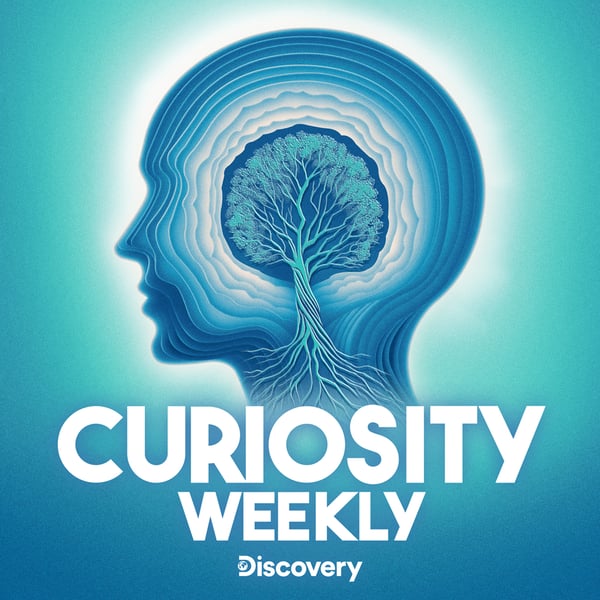“What Is Life?” with Carl Zimmer, Why You Always Have Room for Dessert, and Learning Myths
Curiosity Weekly
Warner Bros. Discovery
4.6 • 935 Ratings
🗓️ 14 March 2019
⏱️ 9 minutes
🧾️ Download transcript
Summary
Learn about common misconceptions around learning that even educators believe; the scientific reason why it feels like you always have more room for dessert; and how science writer Carl Zimmer responded when we asked him “what is life?”
In this podcast, Cody Gough and Ashley Hamer discuss the following stories from Curiosity.com to help you get smarter and learn something new in just a few minutes:
- Even Educators Believe Common Myths About Learning — https://curiosity.im/2tFh7MR
- Here's the Scientific Reason You Always Have Room for Dessert — https://curiosity.im/2tDeMCa
More from Carl Zimmer:
- Carl Zimmer’s website — https://carlzimmer.com/
- “She Has Her Mother’s Laugh: The Powers, Perversions, and Potential of Heredity” — https://amazon.com
- “Matter,” Zimmer’s weekly science column for The New York Times — http://www.nytimes.com/column/matter
- “What Is Life,” a podcast series of live conversations between writer Carl Zimmer and eight leading thinkers on the question of what it means to be alive — https://itunes.apple.com/us/podcast/what-is-life/id1451004288?mt=2
- Follow @CarlZimmer on Twitter — https://twitter.com/carlzimmer
- Additional publications from Carl Zimmer — https://amazon.com
If you love our show and you're interested in hearing full-length interviews, then please consider supporting us on Patreon. You'll get exclusive episodes and access to our archives as soon as you become a Patron! https://www.patreon.com/curiositydotcom
Download the FREE 5-star Curiosity app for Android and iOS at https://curiosity.im/podcast-app. And Amazon smart speaker users: you can listen to our podcast as part of your Amazon Alexa Flash Briefing — just click “enable” here: https://curiosity.im/podcast-flash-briefing.
Find episode transcript here: https://curiosity-daily-4e53644e.simplecast.com/episodes/what-is-life-with-carl-zimmer-why-you-always-have-room-for-dessert-and-learning-myths
Hosted on Acast. See acast.com/privacy for more information.
Transcript
Click on a timestamp to play from that location
| 0:00.0 | Hi, we're here from Curiosity.com to help you get smarter in just a few minutes. |
| 0:05.0 | I'm Cody Gough. |
| 0:06.0 | And I'm Ashley Hamer. |
| 0:07.0 | Today you learn about common learning myths that even educators believe, |
| 0:11.0 | and the scientific reason why it feels like you always have more room for |
| 0:13.9 | dessert like pie. Happy pie day! Happy pie day! You'll also hear what happened when |
| 0:19.2 | we asked science writer Carl Zimmer a pretty big question. What is life? |
| 0:23.4 | But satisfy some curiosity. |
| 0:25.0 | We started yesterday's episode with a little bit of myth-busting, so why not do it again? |
| 0:30.0 | This time we'll talk about misconceptions around learning, |
| 0:33.2 | and according to one study, even educators believe these seven myths. |
| 0:37.7 | As reported by how stuff works, this study looked at results from a true or false survey |
| 0:42.0 | taken by more than 3,000 respondents. |
| 0:45.1 | There were three groups of participants who took the survey. |
| 0:47.9 | One was the general public, one was general educators, and one was people who had taken |
| 0:52.1 | college neuroscience courses. what the study called people with high neuroscience exposure. |
| 0:58.0 | And these myths are so pervasive, they were believed by 68% of the general public, 56% of educators, so yeah more than half, and 46% of the |
| 1:09.7 | neuroscience exposed group, which is pretty close to half too. Here are the seven myths. |
| 1:14.8 | First, individuals learn better when they receive information in their |
| 1:18.9 | preferred learning style. Sorry but research has shown those don't exist. |
| 1:24.0 | Second, children have learning styles that are dominated by a particular sense, like hearing or |
| 1:29.6 | seeing. |
... |
Please login to see the full transcript.
Disclaimer: The podcast and artwork embedded on this page are from Warner Bros. Discovery, and are the property of its owner and not affiliated with or endorsed by Tapesearch.
Generated transcripts are the property of Warner Bros. Discovery and are distributed freely under the Fair Use doctrine. Transcripts generated by Tapesearch are not guaranteed to be accurate.
Copyright © Tapesearch 2025.

